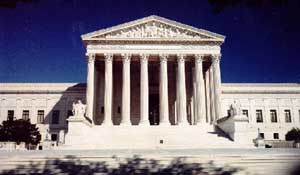-
- Constitutional Marriage Amendment reintroduced in Congress
- Supreme Court to hear Texas sodomy case this month
- Texas bans recognition of same-sex unions formed in other states
- Kentucky governor signs order protecting GLBT state employees
- Philadelphia Boy Scout council to stop discriminating against gays
- Presbyterians end convention without lifting ban on gay clergy
- Suspect in bombing of Atlanta gay bar captured
- National News Briefs
- World News Briefs
-
- An interview with the National Gay & Lesbian Task Force’s new executive director, Matt Foreman
- Democratic presidential candidates not pro-gay enough for NGLTF Policy Institute, says report
- Londoner takes title in 2003 International Mr. Leather competition
- GLBT leaders meet to decide whether a ‘gay agenda’ really exists
national
Supreme Court to hear Texas sodomy case this month
Poll shows nearly 90 percent of Americans oppose antigay sodomy laws
Published Thursday, 05-Jun-2003 in issue 806
WASHINGTON (AP) — As the Supreme Court edges toward its summer break, unfinished business includes several key cases, including issues such as affirmative action, mandatory Internet filters at public libraries and antigay sodomy laws.
June usually is the court’s busiest month, or at least the time when its doings make the most headlines. This year the justices are due to hand down rulings in more than 20 cases, including the two that will govern how universities may consider an applicant’s race in deciding admissions.
Although the Supreme Court already has narrowed the use of affirmative action in other areas, supporters say banning it for top colleges would mean a quick return to almost all-white classrooms.
Absent such a potentially momentous decision, the year’s marquee case would have been Lawrence v. Texas, a challenge to a law criminalizing gay sex. The court may be prepared to reverse an unpopular 16-year-old ruling in a Georgia case that upheld similar laws (Bowers v. Hardwick).
“For the gay community, Lawrence is their Brown v. Board of Education, their major civil rights case,” said Georgetown University law professor Richard Lazarus.
Most states have repealed anti-sodomy laws. Where they still exist, they are rarely enforced. Yet the laws undermine gay equality in other areas and are fundamentally unfair, the lawyer for two gay men told the court when the case was argued in March.
The case began when police burst into a Houston bedroom and arrested the two for a sex act that would have been legal for a heterosexual couple.
A new poll conducted by Witeck-Combs and Harris Interactive Research showed that 74 percent of American adults surveyed in April favor the U.S. Supreme Court overturning state laws that criminalize private, consenting sexual relations between same-sex couples — yet allows that same private conduct to occur between opposite-sex couples.
The survey also revealed that Americans almost equally oppose laws regulating consenting sexual relations that occur in the private homes of opposite-sex and same-sex couples. Nearly nine out of 10 Americans (87 percent) oppose state laws regulating private, sexual relations that are applied to opposite-sex married adult couples and almost as many (82 percent) oppose such laws that are applied to same-sex adult couples in a domestic partnership.
“Even when we exclude respondents who self-identify as [GLBT], support for overturning state sodomy laws does not change significantly,” said Darin Johnson, vice president at Witeck-Combs Communications. “It is clear that an overwhelming majority of Americans believe the Supreme Court should overturn all state laws that interfere with private sexual relations between consenting adults, whether same-sex or opposite-sex couples.”
“These numbers tell the same story we’ve been telling courts in this country for years: the vast majority of Americans support the right to privacy of all people, including gays and lesbians, and oppose anti-gay discrimination,” said Kevin Cathcart, executive director of Lambda Legal Defense and Education Fund, the national organization bringing the Supreme Court challenge to consensual sex laws.
The national online survey was conducted between April 17 and 23 — prior to the prominent media attention given to Senator Rick Santorum’s interview last month with the Associated Press, in which he expressed antigay sentiments while voicing his support of upholding sodomy laws.
|
|
Copyright © 2003-2025 Uptown Publications


